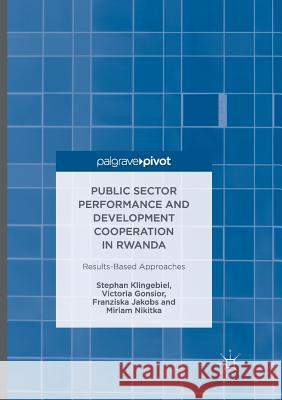Public Sector Performance and Development Cooperation in Rwanda: Results-Based Approaches » książka



Public Sector Performance and Development Cooperation in Rwanda: Results-Based Approaches
ISBN-13: 9783319825090 / Angielski / Miękka / 2018 / 96 str.
Public Sector Performance and Development Cooperation in Rwanda: Results-Based Approaches
ISBN-13: 9783319825090 / Angielski / Miękka / 2018 / 96 str.
(netto: 211,33 VAT: 5%)
Najniższa cena z 30 dni: 212,02
ok. 16-18 dni roboczych.
Darmowa dostawa!
Abbreviations............................................................................................................................. IV
Contents..................................................................................................................................... VI
Boxes, Figures and Tables........................................................................................................ VII
Abstract....................................................................................................................................... 1
1. Introduction......................................................................................................................... 2
1.1. Conceptual Background and Purpose of the Study....................................................... 21.2. Case Selection: Rwanda´s DPA - Imihigo...................................................................... 3
1.3. Research Design and Used Methods............................................................................ 4
1.4. Outline of the Report.................................................................................................... 8
2. Theoretical Framework: RBApps......................................................................................... 8
2.1. Conceptual Debates...................................................................................................... 8<2.1.1. Performance as in Public Sector Reform/New Public Management.................... 9
2.1.2. Results as in Development Cooperation and Aid Effectiveness.......................... 10
2.2. The Concept RBApp.................................................................................................... 12
2.2.1. Actor Constellations............................................................................................. 12
2.2.2. Characteristics..................................................................................................... 14
2.3. RBApps and the Usage of Country Systems................................................................ 172.4. Critique, Challenges and Limitations of RBApps........................................................ 18
2.4.1. RBApps and development cooperation................................................................ 18
2.4.2. Performance indicators....................................................................................... 19
2.4.3. Incentive schemes................................................................................................ 20<
2.5. Concluding Remarks................................................................................................... 21
3. Case Study: Imihigo – a Traditional Rwandan Concept as a RBApp................................. 223.1. Country Context.......................................................................................................... 23
3.2. Actor Constellation..................................................................................................... 26
3.2.1. Responsibilities at the Central and the District Level.......................................... 27
3.2.2. Discussions........................................................................................................... 32
3.3. Characteristics............................................................................................................ 333.3.1. Target Setting....................................................................................................... 33
3.3.2. Monitoring, Evaluation and Verification............................................................. 36
3.3.3. Reward Mechanism............................................................................................. 39
3.4. Concluding Remarks................................................................................................... 41
4. Imihigo and Development Cooperation: What kind of relationship?............................... 43
4.1. The Rwandan Aid Policy.............................................................................................. 434.2. Imihigo: a Country System for Development Cooperation?....................................... 44
5. Final Conclusion................................................................................................................. 49
References................................................................................................................................... I
Stephan Klingebiel is Department Head (Bilateral and Multilateral Development Policy) at the German Development Institute / Deutsches Institut für Entwicklungspolitik (DIE). His research focuses on political economy of aid, aid and development effectiveness, political economy and governance issues in sub-Saharan Africa, and crisis prevention and conflict management.
Victoria Gonsior is a consultant for Public Finance Management at GFA Consulting Group. She participated in the Postgraduate Training Programme and worked as a researcher at the German Development Institute. Her research concentrates on development economics with a focus on public finance.
Franziska Jakobs is a consultant for Governance at GFA Consulting Group, Germany. She completed the Postgraduate Training Programme and worked as a researcher at the German Development Institute. Her research mainly focuses on good governance issues, in particular decentralization, public service delivery and local governance.
Miriam Nikitka is a consultant in the Monitoring & Evaluation Unit at GFA Consulting Group. She participated in the Postgraduate Training Programme at the German Development Institute. Her research concentrates on results-based approaches, results-oriented monitoring and complex strategic evaluations.
This study provides a conceptual framework for analysing Results-Based Approaches to improving public sector effectiveness and efficiency according to their actor constellation and shared characteristics. Though there is consensus regarding the importance of functioning public sector agencies and organizations for sustainable development, public sector reform efforts have historically only had modest success. Results-Based Approaches aim at improving public sector performance through the establishment of reward modalities on the domestic as well as international levels, and the authors of this work evaluate the potential of these approaches to provide an entry point for development cooperation. Applying their framework to empirical data obtained from fieldwork in Rwanda, they analyse the main domestic performance approach – Imhigo – and suggest how the system might be strengthened.
Stephan Klingebiel is Department Head (Bilateral and Multilateral Development Policy) at the German Development Institute / Deutsches Institut für Entwicklungspolitik (DIE). His research and university teaching focus on political economy of aid, aid and development effectiveness, political economy and governance issues in sub-Saharan Africa, and crisis prevention and conflict management. He is a regular Visiting Professor at Stanford University (Bing Overseas Studies Program, Cape Town) and a visiting lecturer at Philipps University Marburg, Germany.
Victoria Gonsior is a consultant for Public Finance Management at GFA Consulting Group. Previously, she participated in the Postgraduate Training Programme and worked as a researcher at the German Development Institute. Her research and work concentrate on development economics with a focus on public finance.
Franziska Jakobs is a consultant for Governance at GFA Consulting Group, Germany. Previously, she completed the Postgraduate Training Programme and worked as a researcher at the German Development Institute. Her research and work mainly focus on good governance issues, in particular decentralization, public service delivery and local governance.
Miriam Nikitka is a consultant in the Monitoring & Evaluation Unit at GFA Consulting Group. Previously, she participated in the Postgraduate Training Programme at the German Development Institute. Her research and work concentrate on results-based approaches, results-oriented monitoring and complex strategic evaluations.
1997-2026 DolnySlask.com Agencja Internetowa
KrainaKsiazek.PL - Księgarnia Internetowa









